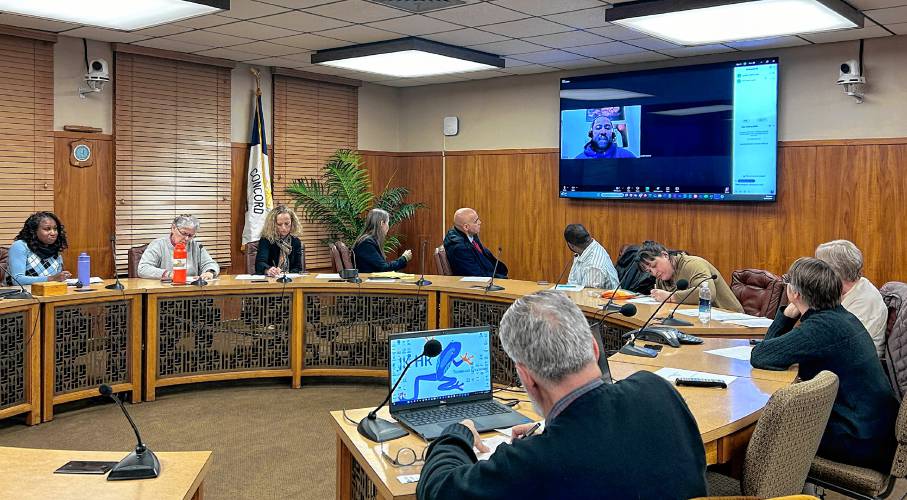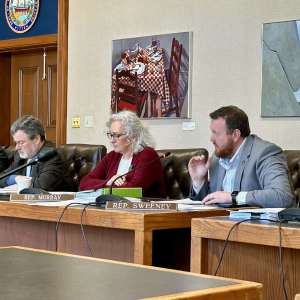In the Trump era, city DEIJB committee weighs its role

Members of Concord's DEIJB Committee meet on December 10, 2024 with newly-hired facilitator Bird Guess, the president of the Texas-based Racial Equity Group. JEREMY MARGOLIS
|
Published: 02-23-2025 11:05 PM
Modified: 02-24-2025 8:44 AM |
Just as the city of Concord’s Diversity, Equity, Inclusion, Justice and Belonging Committee has started to put rubber to road, laying out the timeline for their first action steps, the national climate surrounding their work has changed.
In President Trump’s first days in office, he signed executive orders that terminated federal “illegal and immoral discrimination programs, going by the name ‘diversity, equity, and inclusion,’ ” and encouraged the private sector to do the same.
Amid the sea change, members of the committee were resolved to forge ahead with their mission.
“I think it is really important that we do not err on the side of silence,” committee member Sheila Zakre said. “It’s certainly easy for people to feel like they have to be silent. … I would not want the city of Concord to be like that.”
The committee has a new chair, Rabbi Robin Nafshi.
“There is a heightened sense of responsibility, of, ‘I’m not going to go quietly and gently,’ ” she said.
Over the next three months, the committee and its facilitator Bird Guess will solicit input from across the city’s population about ways that city government and services could be more accessible, inclusive, representative and fair. This will include focus groups as well as written feedback. Guess would then compile that input and present it as a report to the committee, which will use it to develop recommendations for the city to adopt. What exactly the next phase would include hasn’t been determined, but public listening sessions, as were undertaken two years ago, have been discussed.
The committee’s work and recommendations, so long as they do not violate existing federal law — namely, the equal protection clause of the 14th Amendment and the 1964 Civil Rights Act — would not constitute “illegal DEI,” according to Guess. He also noted guidance from multiple states’ attorneys general with the same conclusions.
Article continues after...
Yesterday's Most Read Articles
 House committee defunds relief program for mothers and children, spares SNAP incentives
House committee defunds relief program for mothers and children, spares SNAP incentives
 No high-speed E-ZPass at Hooksett tolls for at least two months
No high-speed E-ZPass at Hooksett tolls for at least two months
 New Hampshire law enforcement to step up traffic enforcement on Route 106
New Hampshire law enforcement to step up traffic enforcement on Route 106
 Schools in Lakes Region explore creating a special education school to bring down costs
Schools in Lakes Region explore creating a special education school to bring down costs
 Work continues on new state psychiatric hospital in Concord
Work continues on new state psychiatric hospital in Concord
 House committee reverses vote, adopts prohibition on DEI activities and spending
House committee reverses vote, adopts prohibition on DEI activities and spending
“The assumption is that all DEI is illegal, and so people are stopping DEI programs,” Guess said. “There is no court decision that has declared DEI best practices. … But, ultimately, I think that municipalities are protected by free speech.”
Despite this assurance that they would not be legally obstructed by the executive orders, committee members worried that the change of power would still pose an obstacle to their work.
Developing meaningful recommendations, they said, would rely on getting honest and open feedback from across the community, including many members — for example, residents who are transgender or who are immigrants — who have been most directly affected by recent policy changes in Washington.
“In the community, the fear level is on top. People are not feeling safe, even in their residences,” said committee member Vijay Bhujel. “People from the New American community, refugees and migrant communities, they have already started feeling the differences.”
Furthermore, for many of those the committee wants to hear from, criticizing the government has never felt like a safe thing to do — regardless of who’s in office.
“We can’t change the climate,” Nafshi said. “But we can recognize that it’s a really hard time for people, and so whatever we can do to make it possible for them to feel safe and to be able to participate without fear of retribution or fear of something coming back to haunt them.”
At the same time, the committee is navigating how to embody the inclusive habits it may end up recommending city-wide.
Members have, for example, requested that all written and presented material be available to its members — and the public — in advance so that everyone, but in particular those who might have a vision or hearing impairment, can be an informed meeting participant. They have asked for meetings no earlier than 6 p.m. to align with common work schedules. They have also requested the option for virtual participation, in compliance open meeting requirements, to accommodate people who are available to participate but cannot physically be in the room.
At the vast majority of city committee meetings, written materials are not available in advance or in copy form to the public at the meeting. Most are scheduled during weekday work hours. Few include remote participation.
Catherine McLaughlin can be reached at cmclaughlin@cmonitor.com. You can subscribe to her Concord newsletter The City Beat at concordmonitor.com.







 Henniker ponders what is a ‘need’ and what is a ‘want’
Henniker ponders what is a ‘need’ and what is a ‘want’ Boscawen residents vote to fund major renovation of public works building
Boscawen residents vote to fund major renovation of public works building ‘Voting our wallets’: Loudon residents vote overwhelmingly against $1.7M bond for new fire truck
‘Voting our wallets’: Loudon residents vote overwhelmingly against $1.7M bond for new fire truck In Pembroke, Education Freedom Accounts draw debate, voters pass budget
In Pembroke, Education Freedom Accounts draw debate, voters pass budget
